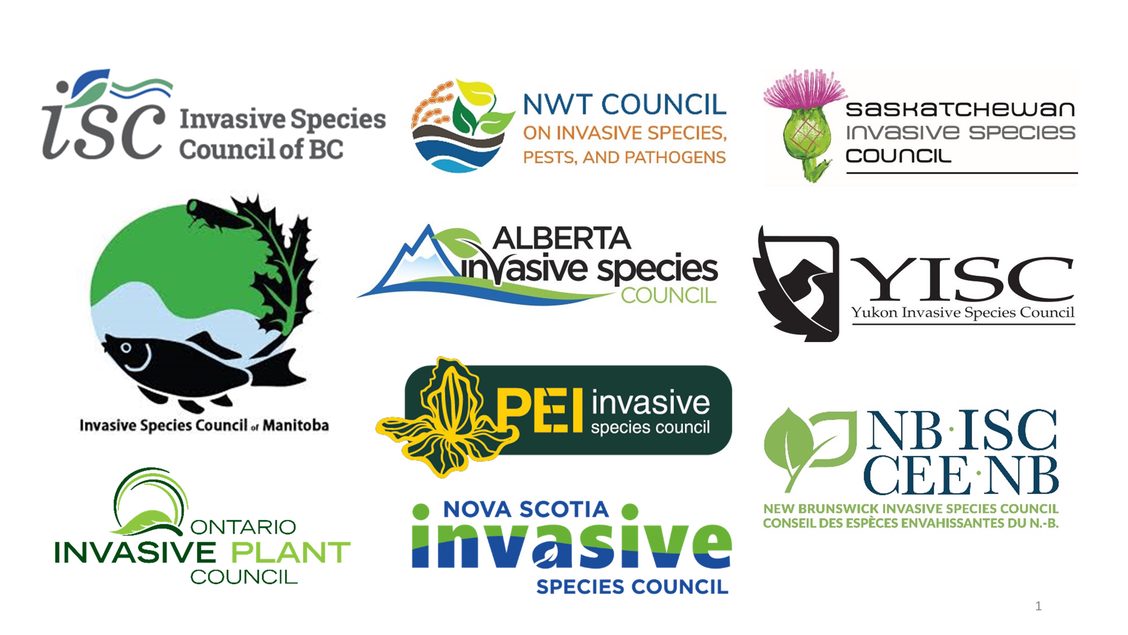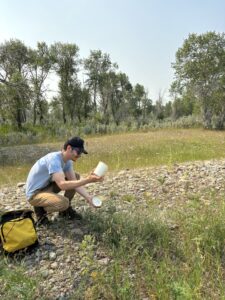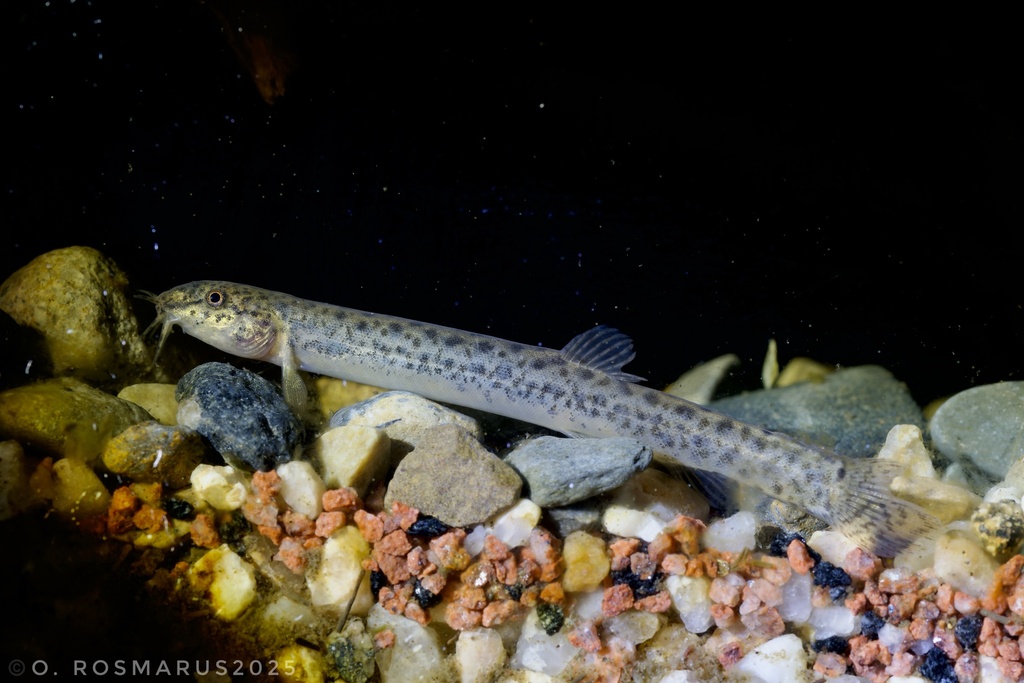Field season is kicking off and our Chapters are active!
Starting fresh on projects and in-person programs for the field season, our Chapter are busy preventing the spread of invasive species in their provinces. From coast to coast to coast, they continue to protect and restore local ecosystems with on-the-ground projects and community outreach. Dive into our latest updates to see what they’ve accomplished this past season!
The Canadian Council on Invasive Species has established a strong network of chapters spanning across Canada, from coast to coast to coast. Each of our 10 chapters is a provincial or territorial invasive species organization with a unique structure and mandate. They work together to create partnerships and address local issues while ensuring consistent messaging and resources to help people in Canada to take responsible actions.
Our Chapters include:
- Alberta Invasive Species Council
- Invasive Species Council of BC
- Invasive Species Council of Manitoba
- New Brunswick Invasive Species Council
- Northwest Territories Council on Invasive Species, Pests and Pathogens
- Nova Scotia Invasive Species Council
- Ontario Invasive Plant Council
- Prince Edward Island Invasive Species Council
- Saskatchewan Invasive Species Council
- Yukon Invasive Species Council

Alberta Invasive Species Council:
Past Events:
-
The 12th Annual Conference of the Alberta Invasive Species Council (AISC), held in Olds, AB from March 5-6, 2025, drew 210 attendees passionate about combatting invasive species. This year’s event featured a diverse array of educational sessions with 21 speakers covering various topics crucial to invasive species management from all over North America, including Montana, Idaho, Wyoming, Manitoba, Ontario and British Columbia, as well as a theatre performance from The Rat Academy highlighting their newest outreach campaign, ‘Rat on Rats!’
Updates:
 Thanks to the Environmental Damages Funding, the AISC will be installing four new CD3 boat wash units this summer in Elk Island National Park, St. Albert, Sturgeon County and the City of Edmonton to assist motorized and non-motorized watercrafts to keep clear of invasive species!
Thanks to the Environmental Damages Funding, the AISC will be installing four new CD3 boat wash units this summer in Elk Island National Park, St. Albert, Sturgeon County and the City of Edmonton to assist motorized and non-motorized watercrafts to keep clear of invasive species!-
As spring arrives, so do the weeds and the AISC’s Biocontrol Release Program! This program aims to use natural predators, such as insects, to manage invasive plant species. The AISC releases insects to control populations of leafy spurge, spotted and diffuse knapweed, Dalmatian toadflax and Russian knapweed. With over 80 releases in 2024, they hope to match or top that this season!
Nova Scotia Invasive Species Council
-
Halifax Regional Municipality
-
Kejimkujik National Park
-
Cape Breton Highlands National Park
-
Coastal Action
-
Clean Annapolis River Project
-
Municipality of East Hants
-
. . . with more to come!
-
Online eDNA training for our upcoming Pilot Monitoring Project on May 8. +50 people attended. Training conducted by DFO’s Senior Biologist, Sarah Kingsbury.
-
In Person eDNA water sampling training on May 16 for Pilot Monitoring Project partners at Kejimkujik National Park and Historic Site.
-
In Person eDNA water sampling training on June 5 for Pilot Monitoring Project partners at Millbrook First Nation.

Ontario Invasive Plant Council
- Grow Me Instead – Promoting Invasive-free Gardening Across Ontario
- The Ontario Invasive Plant Council’s Grow Me Instead Guide, created by the Horticulture Outreach Collaborative, was created to assist gardeners in making informed decisions about the plants that they are buying for their gardens, helping to educate and avoid the use of invasive plants. This 1.5hr webinar will outline several problematic garden plants and suggest native alternative that are proven to non-invasive or native, easily found and widespread availability and have similar requirements, shape and garden uses as the invasive species.
Featuring: Claudette Sims, Rick Gray and Shaun Booth
- The Ontario Invasive Plant Council’s Grow Me Instead Guide, created by the Horticulture Outreach Collaborative, was created to assist gardeners in making informed decisions about the plants that they are buying for their gardens, helping to educate and avoid the use of invasive plants. This 1.5hr webinar will outline several problematic garden plants and suggest native alternative that are proven to non-invasive or native, easily found and widespread availability and have similar requirements, shape and garden uses as the invasive species.
- Two NEW Best Management Practices have now been completed and are posted on our website:
- Burdock Best Management Practices (includes common burdock, greater burdock, woolly burdock): https://www.ontarioinvasiveplants.ca/invasive-plants/species/burdock/
- Manitoba Maple Best Management Practices: https://www.ontarioinvasiveplants.ca/invasive-plants/species/manitoba-maple/
- Two NEW Best Management Practices are in the final stages of desktop publishing:
- Oriental Bittersweet Best Management Practices
- Winged Euonymus Best Management Practices
- CBC news article (Vicki was interviewed for this article): Lakefront homeowners in Sudbury denied permission to use herbicides to kill an invasive plant species.
- Aquatic Invasive Plant Best Management Practices Guide: Features 19 plants on the Ontario Aquatic Invasive Plant List. We are in the process of updating this document for release at the end of February 2025.
- Introduction to Aquatic Invasive Species – June 19 (12-1:30pm EST)
This 1.5 hr session will cover the biology, life cycle, habitat, pathways of spread and impacts of several invasive aquatic plants that have negative impacts on Ontario’s environment, economy and society. Participants will learn how to identify the following 10 invasive aquatic plant species: Eurasian Water-milfoil, European Frog-bit, Water Hyacinth, Water Lettuce, European Water Chestnut, Water Soldier, Brazilian Elodea, Hydrilla, Carolina Fanwort, Yellow Floating Heart.
*VIRTUAL EVENT* over Zoom
Cost: $15
-
2025 OIPC and OPWG Conferences – OIPC will host their annual Ontario Invasive Plant Council Conference and Ontario Phragmites Working Group Meeting virtually on January 16th, 2025 and January 23rd, 2025, respectively. Stay tuned for registration details.
-
The 2025 OIPC conference theme is The Leading Edge of Invasion. This year’s theme will address how we can stay ahead of the “invasion curve”. It will showcase new and upcoming invasive species, cutting-edge research to detect and mitigate their impacts, and emphasize the importance of adaptive management strategies. This event will encourage people to explore innovative strategies, programs and partnerships to address the future spread of invasive species through a “leading-edge” perspective. Click here for more information: https://www.ontarioinvasiveplants.ca/events/2025-ontario-invasive-plant-council-conference/
-
We are currently accepting abstract submissions until November 15th, 2024.
-
The OIPC invites proposals from all fields, with projects focused on showcasing new and upcoming invasive species, cutting-edge research to detect and mitigate their impacts, and emphasize the importance of adaptive management strategies. While this conference is primarily focused in Ontario, we will be including perspectives outside Ontario as well. Click this link for more details: https://www.ontarioinvasiveplants.ca/2025-oipc-conference-call-for-abstracts/
-
-
-
The 2025 OPWG conference theme is The Leading Edge of Invasion. Although Invasive Phragmites is not a new invader, our understanding of this invasive plant, its “invasion curve” and its management are continuously evolving. This event will showcase cutting-edge research to mitigate the impacts of Invasive Phragmites and emphasize the importance of adaptive management strategies. It will encourage people to explore innovative strategies, programs and partnerships to address the future spread of Invasive Phragmites through a “leading-edge” perspective. Click here for more information: https://www.ontarioinvasiveplants.ca/events/2025-ontario-phragmites-working-group-meeting/
-

